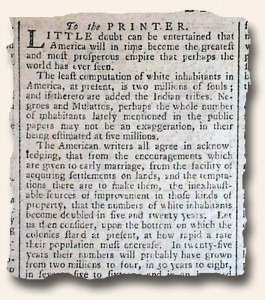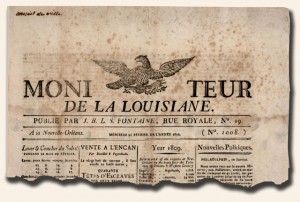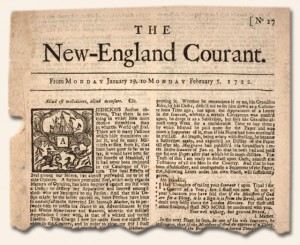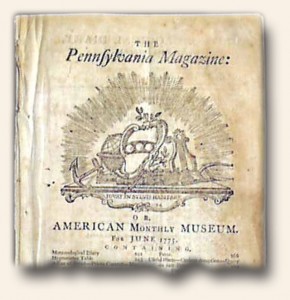The Traveler… a sweet business…
September 21, 2015 by The Traveler · Leave a Comment
 Today I traveled to back London, England by The London Chronicle of September 21, 1765. I found the reporting of some sweet business happening in New England, the making of maple syrup! “Having chosen out a large maple-tree, suitable for the purpose, they with an axe box it…a kind of trough is prepared… in order to retain the sap as it runs down. By this means upwards of 30 gallons from one tree has been drawn in a day;… produces a sugar, the grain of which is equal in fineness to the the Jamaica… upwards of 600 lb. was made by one man the last season…”
Today I traveled to back London, England by The London Chronicle of September 21, 1765. I found the reporting of some sweet business happening in New England, the making of maple syrup! “Having chosen out a large maple-tree, suitable for the purpose, they with an axe box it…a kind of trough is prepared… in order to retain the sap as it runs down. By this means upwards of 30 gallons from one tree has been drawn in a day;… produces a sugar, the grain of which is equal in fineness to the the Jamaica… upwards of 600 lb. was made by one man the last season…”
~The Traveler
They put it in print… the Stamp Act…
August 27, 2015 by GuyHeilenman · Leave a Comment
 Some of the most noteworthy events in history have humble beginnings. Such is the case with the announcing of the passage of The Stamp Act in The Gentleman’s Magazine, March, 1765. Under the Historical Chronicle section is the rather inconspicuous note, “Lord Mansfield, as speaker, and the Earls Gower and Marchmont, by virtue of a commission from his majesty, gave the royal assent to the following bills: …for laying a stamp duty in the British colonies in America.” While this official notification of the Stamp Act most likely flew under the radar of most readers of the day, there is no doubt regarding its significance. I wonder which one-liners which go unnoticed today will prove similar ten years from now?
Some of the most noteworthy events in history have humble beginnings. Such is the case with the announcing of the passage of The Stamp Act in The Gentleman’s Magazine, March, 1765. Under the Historical Chronicle section is the rather inconspicuous note, “Lord Mansfield, as speaker, and the Earls Gower and Marchmont, by virtue of a commission from his majesty, gave the royal assent to the following bills: …for laying a stamp duty in the British colonies in America.” While this official notification of the Stamp Act most likely flew under the radar of most readers of the day, there is no doubt regarding its significance. I wonder which one-liners which go unnoticed today will prove similar ten years from now?
The put it in print… America will become the greatest nation ever!
June 15, 2015 by TimHughes · Leave a Comment
 One of the joys of reading old newspapers is the opportunity to discover what were, in fact, very prophetic statements made long before anyone could have known they would become true. As they say, hindsight does provide 20-20 vision.
One of the joys of reading old newspapers is the opportunity to discover what were, in fact, very prophetic statements made long before anyone could have known they would become true. As they say, hindsight does provide 20-20 vision.
One of the best is found in “The London Chronicle” issue of Nov. 2, 1765. Some 150 years before the per-eminence of America as a world power both military and economically, a writer begins an article: “Little doubt can be entertained that America will in time become the greatest and most prosperous empire that perhaps the world has ever seen…”.
How true that statement would become, but to predict that future nearly a dozen years before America would even declare independence from the mother country was truly a stretch. It’s a neat find in an otherwise inconspicuous newspaper.
The City of Boston receives noteworthy journalism award…
March 9, 2015 by GuyHeilenman · Leave a Comment
 The following is a note we recently received from one of the collector friends of Rare & Early Newspapers:
The following is a note we recently received from one of the collector friends of Rare & Early Newspapers:
Happy to report that the section “Boston Journalism Firsts” and other contents of the Boston Journalism Trail site were used to nominate Boston for the Historical Site in Journalism Award given by the American Society of Professional Journalists, the largest journalists organization in the United States. The organization gave its 2014 award to Boston, thus for the first time honoring a whole city for the totality of its contributions to journalism. The organization’s president is to present the city’s mayor with a memorial plaque to be placed in a public space in downtown Boston in 2015. Thanks for all your support over the years.
To view details:
http://www.spj.org/news.asp?REF=1260
How Paul Revere’s Ride Was Published And Censored IN 1775…
February 6, 2015 by GuyHeilenman · Leave a Comment
 Todd Andrlik, founder and editor of Journal of the American Revolution, and curator, author and editor of Reporting the Revolutionary War: Before It Was History, It Was News (Sourcebooks, 2012), has assembled and written a great piece of scholarship in regards to Paul Revere – specifically, how he was viewed by his contemporaries, using the lens of original newspapers of his day. An excerpt is as follows:
Todd Andrlik, founder and editor of Journal of the American Revolution, and curator, author and editor of Reporting the Revolutionary War: Before It Was History, It Was News (Sourcebooks, 2012), has assembled and written a great piece of scholarship in regards to Paul Revere – specifically, how he was viewed by his contemporaries, using the lens of original newspapers of his day. An excerpt is as follows:
Because of Henry Wadsworth Longfellow’s famous poem, “Paul Revere’s Ride,” most people think that Revere was critical to the start of the Revolutionary War. In trying to dispel Longfellow’s myth of a lone hero, modern scholars have portrayed Revere as just one rider among dozens on 18-19 April 1775, and argued that his previous rides for the Patriot cause might have been more important. A survey of newspapers from 1774 and 1775 shows that in fact those earlier rides had made Revere prominent enough that he did stand out in reports of the fighting at Lexington and Concord, even as Massachusetts authorities kept the extent of his activities quiet.
Paul Revere was a man who wore many hats. He was well known throughout New England for his engravings, his silver work, his Masonic fellowship and his political activity. Plus, in 1774 and early 1775, Revere worked as an express rider for the Boston Committee of Correspondence and the Massachusetts Committee of Safety. He frequently carried letters, newspapers and other important communication between cities, including Boston, Hartford, New York and Philadelphia. Revere’s early dispatches related to some of the biggest American events of the eighteenth century, including the destruction of the tea, the Boston Port Bill and the Suffolk Resolves. In December 1774, at the age of 39, he rode to Portsmouth to alert local Patriot leaders that the Royal Navy was on its way to seize gunpowder and arms from Fort William and Mary. Newspaper printers would eagerly print Revere’s tidings, frequently attributing…
This is a must-read article! View Todd’s scholarship in its entirety at:
How Paul Revere’s Ride Was Published And Censored In 1775
A gem from the American Antiquarian Society…
January 30, 2015 by TimHughes · Leave a Comment
 In celebration of its 20oth anniversary the American Antiquarian Society published a beautiful exhibition catalog titled “In Pursuit Of A Vision – Two Centuries of Collecting at the American Antiquarian Society”. Featured are a fascinating array of books, documents, maps & other paper ephemera, as well as several very rare & unusual newspapers we felt worthy of sharing with our collectors (with permission from the A.A.S.).
In celebration of its 20oth anniversary the American Antiquarian Society published a beautiful exhibition catalog titled “In Pursuit Of A Vision – Two Centuries of Collecting at the American Antiquarian Society”. Featured are a fascinating array of books, documents, maps & other paper ephemera, as well as several very rare & unusual newspapers we felt worthy of sharing with our collectors (with permission from the A.A.S.).
93. “Moniteur de la Louisiane“, New Orleans, February 21, 1810
The Moniteur de la Louisiane, established in 1794 by Louis Duclot, was the first newspaper published in Louisiana. Because so few early issues have survived, its history is difficult to piece together. The earliest known issue — since lost in a fire but preserved in facsimile — was dated August 25, 1794; all other extant issues are from the 1800s. Although founded when Louisiana was under Spanish control, the Moniteur was published primarily in French, the language of Louisiana’s majority population. Over time the newspaper grew in size from octavo to quarto to folio, and it also change publishers. This 1810 issue lists Jean Baptiste Le Seur Fontaine as publisher, A role he had assumed by 1803 and perhaps as early as 1797. Publication apparently ceased in 1814. When Fontaine died that year, he bequeathed to the city of New Orleans his personal file of the Moniteur.
This is one of two issues of the Moniteur sent to AAS by Edward Larocque Tinker as part of his very substantial gift of early Louisiana newspapers and periodicals.
They put it in print…
January 12, 2015 by TimHughes · Leave a Comment
 Tabloid journalism was alive and well in 18th century America. If you thought “sleazy” reports were a concoction of the 20th century, you would be wrong, as newspaper editors had, for hundreds of years, few concerns about slandering those they found offensive or who were on the other side of the political fence.
Tabloid journalism was alive and well in 18th century America. If you thought “sleazy” reports were a concoction of the 20th century, you would be wrong, as newspaper editors had, for hundreds of years, few concerns about slandering those they found offensive or who were on the other side of the political fence.
The “Pennsylvania Ledger And Weekly Advertiser” of December 24, 1777” was a Tory newspaper (loyal to the King, not the American cause of independence) and on page 2 the editor printed portions of a letter from George Washington to his wife, intercepted on its route. Obviously no friend of Washington’s, he even publishes the letter as a separate piece and offers for sale in his shop: ” “The printer has received from New York a few copies of an intercepted letter from General Washington to his Lady, dated June 24, 1776, which he is now selling at his shop in Market Street. The following is an extract.”
For United We Stand…
December 8, 2014 by GuyHeilenman · Leave a Comment
“And if a house is divided against itself, that house will not be able to stand.”
(God, as written by Mark in Mark 3:25)
“United we stand, divided we fall.”
(Aesop)
“A house divided against itself cannot stand.”
(Abraham Lincoln)
“For united we stand; Divided we fall. And if our backs should ever be against the wall. We’ll be together…”
(The Brotherhood of Man)
Bringing people together is no small task. Those who have the ability to rally factions behind a common cause are few and far between. Those who can do so for a noble cause are a true rarity.
While we all acknowledge Abraham Lincoln’s efforts to this end as exemplified in both his “House Divided” speech and yet again in his “Gettysburg Address”, it was another relatively unknown true American patriot who was instrumental in doing the same soon after the close of the American Revolutionary War: Dr. Benjamin Rush. Below please find (and enjoy) the full text of “Address to the People of the United States”, which begins:
“There is nothing more common that to confound the terms of the American revolution with those of the late American war. The American war is over; but this is far from being the case with the American revolution.”,
and concludes:
“PATRIOTS of 1774, 1775, 1778—HEROES of 1778, 1779, 1780! come forward! your country demands your services!—Philosophers and friends to mankind, com forward! your country demands your studies and speculations! Lovers of peace and order, who declined taking part in the late war, come forward! your country forgives your timidity, and demands your influence and advice! Hear her proclaiming, in sighs and groans, in her governments, in her finances, in her trade, in her manufactures, in her morals, and in her manners, ‘THE REVOLUTION IS NOT OVER!’ “, Dr. Benjamin Rush, MD.
What a tremendous rally for all Americans to unite behind a noble cause: the establishment of a nation like none other!
To read the complete text of this amazing speech, go to: American Museum, January, 1787
A gem in the American Antiquarian Society…
July 28, 2014 by TimHughes · 1 Comment
In celebration of its 20oth anniversary the American Antiquarian Society published a beautiful exhibition catalog titled “In Pursuit Of A Vision – Two Centuries of Collecting at the American Antiquarian Society”. Featured are a fascinating array of books, documents, maps & other paper ephemera, as well as several very rare & unusual newspapers we felt worthy of sharing with our collectors (with permission from the A.A.S.).
 63. “The New-England Courant“, Boston, February 5, 1722
63. “The New-England Courant“, Boston, February 5, 1722
As a member of the family which controlled the Boston Globe,and as the newspaper’s treasurer from 1893 to 1937, Charles Henry Taylor avidly collected publication on the history of American printing and journalism. He generously donated to AAS anything it lacked. Among his gifts were runs of many important American newspapers, including this issue — the second earliest at AAS — of The New-England Courant.
Only the third newspaper to be printed in Boston, The New-England Courant was published by James Franklin from 1721 to 1726. During the Courant’s first two years, its popularity was bolstered by the publication of fourteen letters from one “Silence Dogood,” the nom de plume of James’s younger brother and apprentice, Benjamin Franklin. But the Courant had a contentious history, as James was often at odds with the provincial government, the powerful Mather family, and other influential Bostonians. In 1723 James was imprisoned by the Massachusetts General Court and ordered to suspend the Courant, a ban which James circumvented by issuing the paper under his brother’s name. Even after Benjamin ran away to Philadelphia in October of that year, the Courant continued to appear under this imprint until it ceased publication.
The front page of this issue contains an extensive article on the smallpox inoculation controversy then raging in Boston. While Cotton Mather and other clergy supported inoculation, many Bostonians disagreed. James Franklin opposed the practice in this and many subsequent articles.
What got the juices flowing for Thomas Paine…
June 30, 2014 by TimHughes · Leave a Comment
“The Pennsylvania Magazine” was one of only two American magazines which published during the years of the Revolutionary War, including a June, 1775 issue containing a great coverage of Battle of Bunker Hill and Washington’s appointment as Commander-In-Chief, and ending with the July, 1776 issue which included the Declaration of Independence.
For most of its 19 month life, which began in January, 1775, it was edited by the famed Thomas Paine, employed by the publisher Robert Aitken. Aitken was often frustrated by Paine’s procrastination in providing material, as mentioned in Isaiah Thomas’ “History of Printing in America”:
“…Aitken contracted with Paine to furnish, monthly, for this work, a certain quantity of original matter; but he often found it difficult to prevail on Paine to comply with his engagement…Aitken went to his lodgings & complained of his neglecting to fulfill his contract…insisted on Paine’s accompanying him & proceeding immediately to business & as the workmen were waiting for copy. He accordingly went home with Aitken & was soon seated at the table with the necessary apparatus, which always included a glass, and a decanter of brandy. Aitken observed, ‘he would never write without that.’ The first glass of brandy set him thinking; Aitken feared the second would disqualify him, or render him intractable; but it only illuminated his intellectual system; and when he had swallowed the third glass, he wrote with great rapidity, intelligence and precision; and his ideas appeared to flow faster than he could commit them to paper. What he penned from the inspiration of the brandy was perfectly fit for the press without any alternation or correction.”



